- Home
- Barbara Metzger
The Hourglass Page 2
The Hourglass Read online
Page 2
“An hourglass? Are your attics to let? It is a medal, by George. And I earned it!”
“Did you, now?” Ardeth passed it back to the officer, who frowned. Ardeth’s hands and clothing were no longer quite so clean.
Willeford said, “You really ought to come with me to the officers’ quarters. This is no place for a gentleman.”
“Yet this is where I am needed most.”
“You shall not succeed in England, you know, not with that attitude. Loyalty to one’s own kind matters.”
Ardeth had heard tales from the major’s men. “The loyalty you showed your soldiers? You rode away on your horse when they were being cut down on foot. I think you do not wish me to speak to your superior officers after all, wounded or not.”
Again, the major’s hand was on his sword. “Are you calling me a coward?”
The earl did not answer. Instead he asked, “Are you thinking of challenging me? Do not bother. I shall not duel. Enough blood has been shed, and life is too precious, even yours.”
The major’s face turned red as he heard snickers from the wounded men. “Foreign scum like you will never be accepted in proper English society. My brother-in-law is the Duke of Sneddin. He’ll see that you are rejected at all the gentlemen’s clubs, refused invitations to the beau monde. You will be a pariah in the polite world.”
“Did I forget to mention the fortune my grandfather amassed in his wanderings, or how my father tripled his wealth?” This was not such a non sequitur to anyone who understood how the aristocracy actually operated. “My own investments have returned a handsome profit also.”
Major Lord Willeford spun on his heels. “You, sir, can go to hell.”
“Ah, but I just came from there.”
Chapter 2
If she kept busy, Genie would not have to think about her situation. With any luck, she would eventually fall into the sleep of exhaustion and not have to think at all. With her luck, though, Genie decided, she’d only have nightmares about being left in the middle of a war with no funds, no family, nowhere to go.
That was no nightmare. That was real. That was her life. Imogene Hopewell Macklin was disgraced, deserted, disowned. Gads.
She wiped another injured soldier’s brow, trying to think of these poor men crammed into the makeshift hospital instead of her own woes. Besides, if she stayed to help nurse the wounded, no one would ask why she did not return to where the officers’ womenfolk were providing care in Brussels, or why she did not go back to her own lodgings there to grieve.
She was no longer welcomed among the ladies, she was too numb to mourn, and she had no lodgings.
Her landlady had panicked and fled, locking all the doors while Genie was out, tossing the tenants’ belongings onto the street. Genie had no money to pay her rent anyway if the woman came back. She could not think about that, either, or her trunks left out for thieves and beggars to carry off what little she owned.
Here she was needed, at least. No one cared that she knew nothing of nursing. These men sought comfort, not cures. They did not mind that her hands were shaking or her voice was quavering. She could offer them water and listen to their prayers. She could write letters to their loved ones, and pen their last wills. What were her problems compared with theirs?
A selfish voice whispered in her mind that the soldiers had loved ones, that they had possessions to bequeath, addresses to send them to. And their wounds would heal. Her pain was inside, where it never would.
She must not think about pain, lest her thoughts skitter toward Elgin. The cad had not even had the decency to die in battle, a hero. No, he’d been caught the night before in the arms of another officer’s wife, too drunk to defend himself, as usual. No, she definitely must not think about Elgin, either.
She almost laughed, despite her despair, because she had nothing left to fill her mind, not the past, not the present, certainly not the future… until the dark stranger strode into the crude hospital tent while lightning flashed.
He’d ridden a black horse, they said. Seeing his black cloak, the black bird on his shoulder, his dark hair and eyes, the men started to whisper about the Angel of Death. This man was helping, though, and standing up for the common soldier against a despised officer. Both actions were unheard of, especially for a titled gentleman. His language bespoke breeding and education, albeit foreign; his apparel indicated wealth; his bearing denoted pride, confidence, power, everything Genie lacked.
Fine bones and a straight nose made him strikingly handsome, too, in an exotic way. No ruddy, round-faced English squire, he was tall and thin, with a pale complexion as if he seldom stepped outdoors, yet he lifted men with ease. His voice was no booming, blustering blare from the hunting field or the battlefield, yet everyone heard when he spoke. His hands were gentle, the soldiers said when he’d moved on, not rough and hurried like those of the surgeons’ other assistants. The soldiers told her they felt honored that the newcomer had tried to relieve their suffering when he could have rested in luxury. Lord Ardeth was certainly no spoiled, pleasure-seeking member of the privileged class, perhaps because of his distant upbringing, Genie supposed. She had been among the ton, had met cabinet ministers and generals, a royal duke, and an Austrian prince. Lord Ardeth was like nothing she had ever known or heard of, so she found him interesting—at a distance.
The earl was fascinating—and frightening. He appeared as if the marble statue of a pagan god had deigned to step off his pedestal and into their midst, bolts of lightning in his hands. All-knowing and all-powerful, he seemed, stone hard and unyielding—in contrast to his kindness. The gods of mythology were a tricksy lot at best, and Genie would not like to be in Lord Ardeth’s way when he recalled his dominion over lesser folk. Just like a godling, or like an earl, everyone was lesser, and he well knew it.
Genie shivered at the notion of confronting such a grand personage, despite the stifling heat. A woman had no defenses against such authority, no secrets. She chided herself for her fears. This was no ballroom where the hostess would perform introductions. Besides, what could her puny existence matter to such as the Earl of Ardeth, anyway?
Then he called to her.
“You there, mistress. I need help.”
Ardeth had found that the living were far more grateful than the dying, who, more often than not, argued, cursed, and fought against their implacable fate.
Some of these men he could save. Others he could make comfortable. Campbell had been a help at first, like a loyal squire at his liege lord’s side. The man was wounded himself, though, and anxious about the horses. Ardeth sent him off with a purse and the promise of a position after the army was done with him. Now he needed an extra pair of hands.
He’d noticed the woman earlier. She had caught his attention at first because she so obviously did not belong here. Better dressed and younger than any other female attending the wounded, she was neither nurse nor nun. As he worked, he watched her from the corner of his eye, speculating about her presence where no lady would dare to be. A camp follower? No, there was an innocence about her, an unmistakable refinement, a frailty no woman of the world possessed, no matter how good an actress. And the men treated her with courtesy.
Any female would envy the young woman’s hair. Despite the scrap of lace covering her head, physical efforts had loosened the plaited bun behind her neck, so strands of red and gold curled at her cheeks and down her shoulders. Like sunset it was, like the molten heat at the center of the earth.
She had a tiny smattering of freckles, too, like gold dust.
He’d seen more beautiful women, of course, but not recently, and not as a man who could appreciate the soft skin, the rounded form, the graceful posture. Ardeth made himself ignore the female’s looks. He was no lust-crazed libertine, even if he had been celibate for centuries. His body was barely flesh. He would not let it burn. For now, what was important was that the woman seemed competent and calm. So he called out to her.
“Me?”
“Thi
s man needs more help than I can provide on my own. Come.”
She hesitated, proving her intelligence to Ardeth. He was no one an obviously gently bred female should know. “Pray, you, come.”
Now she did edge closer, stepping to the opposite side of the cot from where he stood over a failing soldier, as far from the stranger as possible. “But… but the doctors said this man was beyond hope.”
“Their hope. The sawbones need to expend their efforts most efficiently.”
She stroked the wounded man’s brow. “But his wounds are so extensive.”
“His days are not done.”
Neither were Elgin’s, nor those of the scores of other fallen soldiers. “No one is ever ready.”
“Nevertheless, every creature on earth has a certain allotment of time. This man has not used his up yet.”
“How can you know?”
“I know. When the sand runs out, a life is over.”
She frowned. “Then we can know when we will die?”
“Some of us.” Six months. “But this is not the time for speculation. Do you have a strong enough stomach?”
Genie had cast up her accounts that morning. She’d had nothing to eat since, so was not in danger of losing another meal. “I can manage.”
He lifted the sheet back. Genie caught her breath.
“You will not faint,” he ordered.
She swallowed, hard. “I shall try.”
And he tried to fit the man’s intestines back into his abdomen, directing her where to press, when to hand him torn sheets and bindings.
“Surely he cannot live.”
The earl glanced around as if looking for something she could not see. “He will!”
As if his saying so made it so, Genie thought, astounded at his lordship’s arrogance. He might have a title and a fortune, but that did not give him the power of life and death. Yet the soldier still breathed. And the next hopeless case, and the next.
At some point—Genie had long lost track of the time, day or night—his man Campbell brought them a tray with hot tea and bread and cold meat. She shook her head no, but the earl did not listen, leading her outside the tent to a bench and commanding her to eat.
The crow flew down and dropped a shiny coin at Lord Ardeth’s feet.
“Not even close,” the earl said.
The large bird cocked his head and looked at Genie with white-rimmed black eyes. “I’m alive!”
She tossed a piece of her bread to the amazing talking creature.
“Say you’re Olive, blast it!” the earl ordered.
The bird looked at the woman again, swallowed the morsel of bread, looked at Ardeth, and said, “You’re alive, blast it.”
Genie smiled. “Silly bird.”
Not so silly. Her smile was so sweet that Ardeth had to smile, too, for the first time in eons. Now he really did feel alive, and more determined than ever to stay past his six months. “Go look some more,” he told the transformed gremlin.
Then he tried to make the woman smile again, for the sheer glory of it, by saying they should have a proper introduction, lest the high sticklers find fault with his manners. “For I realize I do not even know the name of my able assistant. That is improper for your society, yes?”
She did smile at that, as if one of the fussy patronesses of Almack’s was watching. “I am Imogene Hopewell Macklin, my lord.”
No “Mrs.” or “Miss” or “Lady,” he noted, his curiosity aroused. “I suppose your family calls you Genie?”
Her smile faded. “They used to.” She sipped at her tea, closing the conversation.
When they had finished the meal—the best his money and Campbell’s scrounging could provide from the officers’ quarters—he was reluctant to end the woman’s rest. She seemed worn to the nub, with a look he’d encountered far too often.
“Did you lose a loved one in the battle?”
Genie brushed crumbs off her soiled gown. Without meeting his eyes, she lied and said, “Yes.”
He did not see a ring, but that meant little in such dire times. Her reticence meant more. “A husband? A brother?”
“Yes.”
“How unfortunate. I am sorry for your double loss.”
She still looked down. “Only one.”
“You married your brother?” Surely Ar would have heard if English laws had changed so drastically.
“Elgin Macklin was my husband, but he told everyone he was my brother.”
“I see.” He did not see, not at all. Why would a man be ashamed to claim this fine young lady as his bride, but not as his kin?
Now that she had begun, Genie wanted him—someone, anyone—to understand. “At first we were posted to Canada, but then his family arranged a lieutenancy for Elgin on General Wellington’s own staff in Portugal, a position of great honor. But the general did not approve of his junior officers being married, much less wedding without the army’s permission.”
“Yet you and Macklin did just that.”
“There were… circumstances. A scandal, to be exact. We had no choice but to wed. My family washed their hands of us, so, again, I had no choice but to follow the drum with Elgin.”
Bitterness crept into her voice as she continued: “When we got to Portugal, he was always going to tell the general next week, next month, but hated to be found in the lie. When I insisted, he swore he would make our marriage public after the coming battle.”
“The gossip columns did not spread word of it?” Ardeth had read the newspapers every chance he had, to keep abreast of current events and customs.
“The families made certain of that. We had a quiet wedding and a hasty departure from the public eye.”
“So he let people think you were brother and sister. Do many gentlemen take their kin into danger?” Some had ridden with the crusaders, but not many.
“If they had no one to care for them at home, yes. And no one suspected this confrontation would take place so close to Brussels, or be so massive. Why, there was dancing last night. Or was it the night before? Many officers’ wives joined their husbands here. Other members of the ton came to make it a festive social gathering. Most fled home when the French threatened to overtake the city.”
“But you stayed.”
“I had nowhere else to go. And Elgin said it was safe, that the British Army could not be defeated.”
“He lied.”
“He lied about many things,” she said, anger in her voice. “Our marriage, our finances, his gambling. At first I understood. He wished to be married as little as I did, and it suited him to be considered a bachelor.”
Ardeth assumed the churl conducted himself as a single man, too. “Later?”
“I tried to be a good wife to him and I thought he became reconciled. He was going to make things right, even if it cost him his place on His Grace’s staff, as soon as he could get the general’s ear. But then it was too late. He was dead.”
“I am sorry.”
“As am I. He might not have been the man I would have selected for a husband, and he might have been foolishly reckless—but he was too young to die.”
“Everyone is.”
She sighed. “I might as well tell you about my further disgrace.”
“You need not.”
“You will hear about it as soon as you join the officers or the diplomatic corps anyway.” She had decided he must be with the Foreign Office, to find himself in the middle of a war. She sighed again before continuing. “The major’s wife came to console me, so I tried to explain to her. She accused me of fabricating the whole story to protect my reputation.”
He let his eyes fall to her waistline. “Again, you had no choice.”
“I had no choice,” she agreed, too weary to wonder how he knew about her pregnancy when she had realized it for herself only recently. Nothing was showing. “She said I was a light-skirt who was using my brother’s death to hide my own sins. But I have my marriage lines and my ring. That is, they are with my trunks in Brusse
ls, if they have not been stolen. The other Englishwomen turned their backs on me, as if I had seduced one of their husbands.”
“Your family will know the truth.”
“My father crossed my name out of the family Bible for bringing shame to his doorstep.”
“Then your husband’s family will take you in, especially if you bear their grandchild.”
“Elgin’s father is dead, and his brother is now Baron Cormack.”
“Cormack should welcome you as a sister, then.”
She shook her head, loosening more tendrils of hair around her face. “It is more complicated than that. You see, my sister was to marry Elgin, but she had her heart set on his brother, Roger, the heir to their father’s title. She arranged for us, Elgin and me, to be compromised, although Elgin never believed I did not have a hand in it. And men she claimed I stole her own true love, so Roger had to wed her out of family honor. No, I cannot go to them.”
“Your sister sounds like a woman I met once in He—Helsinki. She murdered her husband and chopped him up into little pieces.”
“Oh, Lorraine would not kill Roger. He is her entrée to the upper echelons of polite society. Our father is a mere squire, not nearly grand enough to suit my sister.”
“What shall you do?”
“I suppose I shall throw myself on the mercy of General Wellington, if he agrees to see me. Or beg in the streets, for I have no money,” she finished with a weak laugh that turned into a moan. Suddenly all the sorrow and terror and horrors she had seen were too much for her. She was weeping, shaking, sobbing—in the earl’s arms.
“Hush, my lady, hush.” How ironic, Ardeth thought. He could finally comfort a grieving widow. He decided not to use any calming tricks; she needed to relieve her rain and fear. And he liked holding her.
When her sobs turned to hiccups and her spasms of heartbroken cries turned to whimpers, he stroked her back and said, “Do not fret, lady. Do not worry anymore. I will see that the general listens and the ladies understand. Your trunks will be restored, your accounts settled.”
“You would do all that? Why?”
“Because it is the honorable thing to do.”

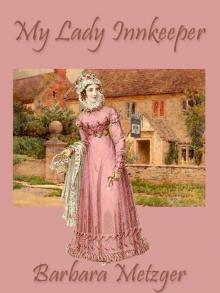 My Lady Innkeeper
My Lady Innkeeper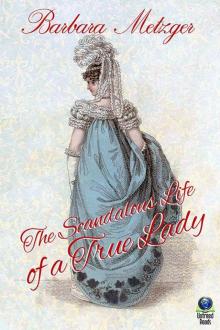 The Scandalous Life of a True Lady
The Scandalous Life of a True Lady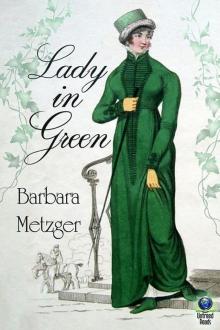 Lady in Green
Lady in Green An Angel for the Earl
An Angel for the Earl Truly Yours
Truly Yours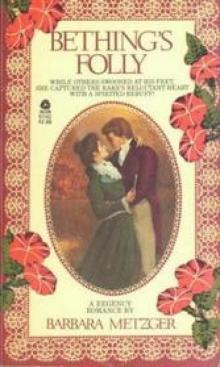 Bething's Folly
Bething's Folly The Christmas Carrolls
The Christmas Carrolls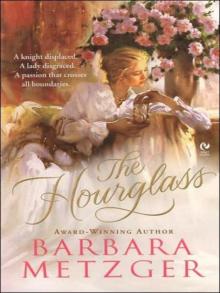 The Hourglass
The Hourglass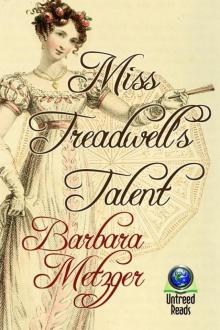 Miss Treadwell's Talent
Miss Treadwell's Talent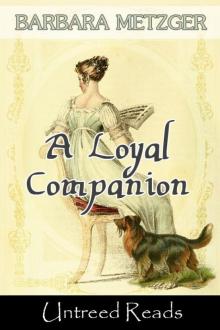 A Loyal Companion
A Loyal Companion Love, Louisa
Love, Louisa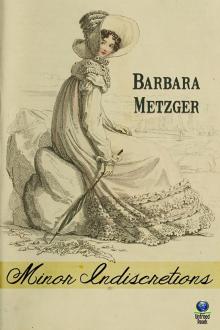 Minor Indiscretions
Minor Indiscretions Jack of Clubs
Jack of Clubs An Enchanted Christmas
An Enchanted Christmas Lady Sparrow
Lady Sparrow Miss Westlake's Windfall
Miss Westlake's Windfall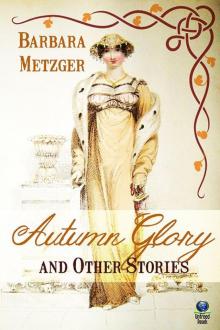 Autumn Glory and Other Stories
Autumn Glory and Other Stories Greetings of the Season and Other Stories
Greetings of the Season and Other Stories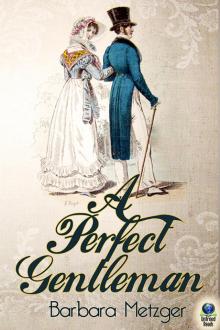 A Perfect Gentleman
A Perfect Gentleman